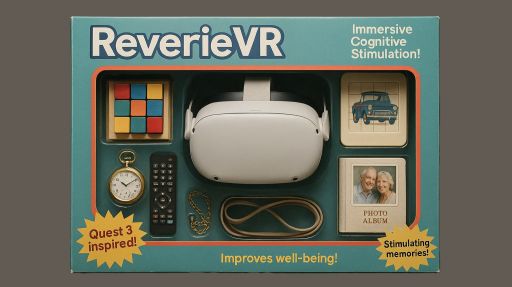
16/04/2025 12:53 pm
Supporting Families Emotionally Through Reverie VR Use
How Reverie VR Helps Families Cope Emotionally with Dementia’s Challenges
Caring for a loved one with dementia at home is profoundly rewarding yet emotionally challenging. Families often face feelings of helplessness, frustration, and grief as dementia progresses, affecting both their loved one and the family dynamic. Finding ways to emotionally cope and support your loved one becomes essential. This is where innovative and gentle tools such as Reverie VR can provide remarkable emotional support, benefiting both you and your loved one.
The Emotional Impact of Dementia on Families
Dementia can deeply impact family carers emotionally. Witnessing cognitive decline, mood swings, or changes in your loved one's personality can evoke feelings of grief, stress, and isolation. Family carers often struggle with the emotional burden of continually providing engaging and compassionate care, while managing their own wellbeing.
Introducing Reverie VR for Emotional Wellbeing
Reverie VR is specifically designed to offer gentle, immersive visualisation experiences that calm, engage, and comfort individuals living with dementia. Beyond aiding the person with dementia, Reverie VR can also significantly reduce emotional strain on family carers, fostering positive interactions and moments of joy within the home environment.
How Reverie VR Supports Emotional Resilience for Families
Creates Shared Positive Experiences
Reverie VR helps families and their loved ones share calming, enjoyable experiences together. By virtually visiting familiar or calming places, families can experience emotional closeness, joy, and nostalgia, strengthening bonds and reducing feelings of loss or helplessness.
Reduces Anxiety and Stress
When your loved one becomes anxious or agitated, your own stress levels naturally rise. Reverie VR provides immediate relief by calming these challenging emotional moments, reducing stress and emotional fatigue for both your loved one and yourself.
Restores a Sense of Control
Having an effective tool readily available to address difficult emotional episodes empowers family carers. This sense of control boosts confidence in caregiving, reduces feelings of helplessness, and enhances emotional resilience.
Scientific Evidence Supporting VR for Emotional Wellbeing
Numerous studies support the positive impact of VR in dementia care, particularly regarding emotional wellbeing:
Reduced Caregiver Stress:
A study in BMC Geriatrics found immersive VR therapy significantly reduced agitation and anxiety in dementia patients, simultaneously reducing caregiver stress and emotional exhaustion (Moyle et al., 2018 - bmcgeriatr.biomedcentral.com).Enhanced Quality of Life for Families:
Research published in JMIR Serious Games indicates VR reminiscence therapy positively influences both dementia patients and their families, improving mood, reducing stress, and strengthening emotional bonds (Appel et al., 2020 - games.jmir.org).Improved Emotional Connections:
According to a systematic review in Frontiers in Psychology, immersive VR experiences significantly improve emotional engagement and social interactions, enhancing emotional wellbeing and family relationships (Manera et al., 2016 - frontiersin.org).
Practical Tips for Using Reverie VR at Home
Integrating Reverie VR into your caregiving routine is straightforward and deeply rewarding:
Personalise VR Experiences:
Choose visualisations that resonate emotionally with your loved one, such as places from their past, to foster powerful emotional connections.Schedule Regular Short Sessions:
Brief sessions of 10–15 minutes several times a week can significantly enhance mood, reduce anxiety, and improve daily routines.Participate Together:
Share VR experiences alongside your loved one, encouraging conversation, reminiscence, and emotional closeness.Track and Adjust:
Monitor emotional responses and mood improvements to tailor experiences and maximise positive outcomes for both of you.
Benefits for Family Carers
Reduced Emotional Burden: Fewer episodes of agitation or anxiety mean lower stress levels and better emotional health for carers.
Greater Caregiving Confidence: The ability to positively manage emotional episodes builds your confidence and resilience.
Enhanced Family Relationships: Sharing meaningful experiences helps sustain close, loving family relationships despite dementia’s challenges.
Conclusion
Dementia caregiving at home is emotionally demanding, but Reverie VR offers a compassionate, powerful way to support your loved one and yourself. By using this gentle, immersive tool, you can create meaningful emotional connections, reduce stress, and bring lasting joy into your home caregiving journey.
Interested in learning more?
To learn more about how Reverie VR can transform your admissions process and improve resident outcomes, please contact our team for a personalised consultation.

16/04/2025 9:46 am
Boost Cognitive Engagement in Dementia with Reverie VR
As a professional carer, you strive daily to provide meaningful, compassionate, and engaging experiences for residents living with dementia. Maintaining cognitive engagement can be particularly challenging, as dementia progressively affects memory, communication, and social interaction. Yet, innovative therapeutic tools like Reverie VR can significantly enhance your ability to connect with residents, providing meaningful cognitive stimulation that truly resonates.



Get in touch & book a demo
For more information or to arrange a free demo please get in touch by pressing the button below.
